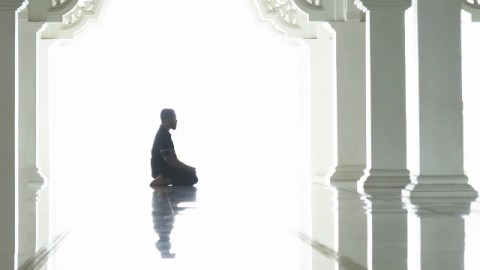To criticise Islam

Here is a statement that shouldn’t result in anyone being called racist: I think religion is a particularly harmful way of viewing the world, because it encourages irrational thought, groupthink, and unhelpful, backward opinions on many issues. Replace religion with one in particular, namely Islam, and you might find yourself on the receiving end of some strange accusations. This is unhelpful to important discussions, regarding the nature of religion and harm.
However, if what was written about religion in general is true, then it seems reasonable to ask follow-up questions, like: Are some religions worse than others? If so, which ones and why? Are religious people more prone to bad ways of thinking than non-religious? These don’t presume answers, since by questioning we come to determine the truth of these situations. But we should recognise that these, if formulated correctly, are empirical questions.
Consider Jainism and Islam. Were you to write a novel or draw cartoons mocking the Jains, would you lose sleep or fear for your life? Of course not. Most of us know that the same can not be said of Islam, even in countries that are secular and have a majority population of non-believers. The major tenet of Jainism is entirely premised on non-violence for all living things, known as ahimsa. This is so strong, Jains often walk with brooms, do not go out at night for fear of trampling animals or insects, refuse to eat honey since this does violence to bees, won’t farm for fear of digging and harming underground creatures, and so on.
If you try Googling “murdered by Jains”, the only results you’ll find are those alongside “getting a date with Megan Fox” or “winning a Nobel Prize”. In other words, it’s almost impossible.
This doesn’t mean Jainism doesn’t deserve criticism. Like anything human, it deserves critical engagement and like almost any religion is filled with much irrationality. However, that doesn’t mean we can’t applaud the wonderful virtue of non-violence and just how powerfully it fosters peaceable actions from its adherents.
However, this tells us something important: Religions, like all world-views, have the power to embed their tenets in our lives. People act on these beliefs as they do any other. In the Jains’ case, the extent of non-violence is believed to the point many of us would consider incredibly inconvenient.
But this is not particular to Jainism or even religion in particular: political, artistic, national, etc., world-views often have built-in systems of dealing with oneself, the world and others.
If it is true that systems, most notably religions, can and clearly do foster their tenets into people’s beliefs, and thus into their actions (even in everyday life), then we can agree we ought to be concerned about exactly what different systems teach, propagate, etc.
And Islam is certainly a religion worth being concerned about.
Criticising Islam, Sam Harris and Islamophobia
Sam Harris, who has made convincing arguments for why Islam is more dangerous than other religions, has for some time now been labelled as a pseudoscientific racist. This doesn’t appear to make sense, since ideas are determined by their internal structure, not by the colour of a believer’s skin.
After all, Islam is a faith, not a race. It can be held by anybody and, unfortunately, often is. We are criticising bad actions and we are concerned about those methods that lead someone to commit such actions. If there is a clear correlation between truly believing Islam and murdering, misogyny and moral absolutism, then we ought to be concerned about Islam – just as we would anything else which did and does the same thing. Considering the high amounts of misogyny, brutality, and intellectual imprisonment that occurs in religious or Islamic countries, and of the kind of intellectual imprisonment that sees young people imprisoned, persecuted, and novelists become targets for assassins, it indicates that there is at least something to be worried about regarding Islam.
My criticism is not built out of hatred for Islam or Muslims (that would mean hating my family), as it is hatred for bad ideas. If Islam really had little to do with why Muslim extremists commit the acts they do, with why Islamic countries treat their women like cattle, with why Islamic communities turn blind eyes to domestic violence or sexism, then fine. Please tell us what the factors are and we will criticise those.
It should be noted that it’s reasonable to assume Islam is at the very least one factor among others and we can criticise more than one thing at a time. Thus, if I happen to criticise the view that Islam promotes irrational, sexist views of women, that doesn’t mean I dispute poverty, education, inequality, or whatever else are problems in these communities.
To assert Islam has absolutely no role in shaping people’s actions is to be blind to how people behave: based on systems of thought, or in-built behaviours they’ve acquired. If we can witness, for example, Jains living uncomfortable but completely peaceful lives, it stands to reason that we can agree religions really do enable people to act certain ways. This means, if religions dictate violence – which Jainism does not – then we can conclude some of its adherents, its communities and so on, will be violent. Islam, in its holy book, in its hadith, in pronouncements of its leaders, does condone violence, misogyny and so on, which means we should expect to see some Muslims act as such.
The degree to which a religious leader must extend his theology in order to sanction violent action is a good indicator of that religion’s moral status. The Ayatollah Khomeini’s call for Salman Rushdie’s death, suicide bombers attacks, the Imams calling for the deaths of cartoonists – these don’t require deep exegesis or twisting of words any more than the gymnastics required to proclaim contemporary modern moral views of Islam.
Many Muslims will read me as saying they are violent, that they are immoral, that they deserve scrutiny more than most. This would be incorrect, since I am asking them to examine what they already believe in the same way they would examine or criticise anything else. Indeed, they are best placed to do so since they are the ones most likely to change hard-liners (just as they are probably also sheltering of bad ideas, due to believing already strange metaphysical things). Basically: I am criticising Islam, not Muslims, as being dangerous since I consider it a collection of bad ideas. And I think bad ideas, especially when propagated and which flirt with violence for non-adherents, are worth discarding since they often lead to harm.
Indeed, my arguments are made with benefiting Muslims; since, as Islamic critic Ibn Warraq has said, it is Muslims who suffer the most under these bad ideas. I have received messages from women in modern, contemporary secular democracies who fear for their safety since they wish to start their own lives, before the shackles of family become a noose. These women aren’t being irrational, since news-stories of Muslim families killing their daughters for “disobedience” are common (just Google “honour killings”). Many will claim this arises out of “culture” or “nationality” or whatever – but, again, I’m not disputing this either. But there’s no reason to think Islamic teaching is completely unrelated to what instigates such a culture in the first place.
Ask yourself again: If these were families of Jains, would these incidents have occurred? Probably not. And then, not particularly because they’re Jains, but because most people would not kill. This means most Muslims would not kill a disobedient daughter, either. However, the point remains that we can pin a common thread of cultural constraints, of heritage, of holy writing, of scripture, of religious doctrine, with such families that kill their daughters. Islam is a factor: to what extent is a constant question, but to deny it completely, to claim racism for even raising the question and more so for presenting evidence, is to deny reality.
We cannot keep calling critics like Sam Harris racist for pointing out evidence, for making reasonable arguments that highlight these sorts of trends. To paint critics of Islam with this weird brush of scientific racism is to enable an unfalsifiable assertion, since using the tools of reason and evidence apparently is merely a façade for (something like) racism; to say Islamic critics are not criticising the poverty, the culture, the psychopathy, or whatever is to miss the point that we can criticise many things including religion and especially Islam.
Reality, not racism
It’s odd having to convince people to take seriously the notion that other people take religion seriously. Again, taking a system of thought seriously is not particular to religion over other kinds of systems – though it is perhaps more prevalent given the broad, metaphysical aspects religion covers.
Thus if religions in general appear to be of more concern than other systems of thought, and if people really do believe in varying degrees what religions dictate, surely we can argue one religion is more dangerous than another if the actions result in more harm? In other words, to argue that Islam is as peaceful as Jainism must surely be a nonsense claim. There is no evidence to support this. If you wish to argue Islam can be, that most of its adherents are as peaceful as Jains (though this is untrue since most people aren’tas non-violent), I wouldn’t disagree provided the evidence is strong.
Thus one can say Islam is a bad system of thought, while also agreeing that most Muslims are good people. But for some reason this seems a difficult connection to sever.
Given what Islam demands of its adherents, it seems particularly odd to call critics of Islam, like Harris, racist. It makes little sense, since this is a question premised on an empirical basis – not one based on judging others because of skin-colour.
After all, as someone with darker skin and who was once Muslim, I am convinced Islam is a more worrying global religion than others. No doubt many will assert that I’m claiming immunity, when all I’m claiming is reasonable argument and data.
It should be noted that whether Islamophobia is an actual “thing”, whether there exist reasons to be concerned about racism associated with Islam, is a question worth engaging. However, you can say this as someone concerned about race issues and, at the same time, argue Islam really is a problem more so than other religions.
Related posts:
On Salman Rushdie and My Apostasy (Against the New Taboo)
Criticism of Islam is not Islamophobia (Friendly Atheist)
Harris and Racism (Secular Alliance)
Image Credit: Ahmad Faizal Yahya / Shutterstock





